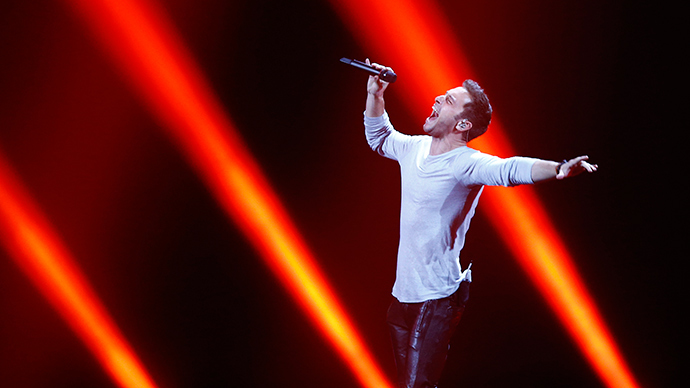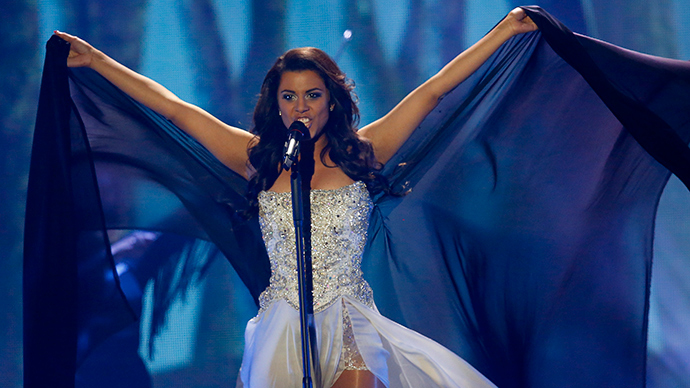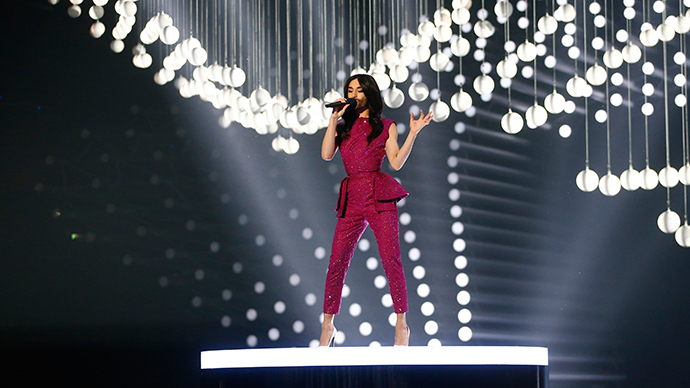How Europe changed its tune- 60 years of Eurovision

On Saturday night in the Wiener Stadthalle in Vienna the grand final of the 60th Eurovision Song Contest takes place. Twenty-seven countries, not all of European, will compete for the prize, won last year by the Austrian ‘bearded lady’ Conchita Wurst.
Eurovision is more than just a song contest- its history tells us much about the way Europe has changed politically, culturally and economically since the mid-1950s, and how the changes have not always been for the best.
Eurovision predates the formation of the European Economic Community (EEC) by several months, but came about from the same desire to bring the countries of Europe (or at least Western Europe) closer together and help prevent future wars. Countries that have close trade links with one another and take part in singing contests together, can’t really go to war against each other, can they?
READ MORE: Vienna installs gay-themed traffic lights ahead of Eurovision 2015
The first contest, held in Lugano, Switzerland on 24th May 1956, saw just seven countries compete and for the first and only time each country was allowed two entries. The winner of the first contest was Switzerland, with Lys Assia singing ‘Das alte Karussell’.
The contest soon became a hit with Europeans. Top stars competed and the songs showcased by Eurovision became international hits.
Ironically, in this pre-globalization era, there was more genuine cross-cultural fertilization in Europe than there is today, when globalization too often means Americanization. Millions of people across the continent bought the song which only came third for Italy in the 1958 Eurovision Song Contest - Volare, (Nel blu, dipinto di blu, ) sung by Domenico Modugno. It’s a wonderful song, which has been covered by many top artists, and remains popular today. Will we remember any songs from recent Eurovisions in 55-years time? I doubt it. The quality of the songs was very high in Eurovision in its first twenty years-reflecting the richer cultural life that we had on the continent in the pre-neoliberal era. Les Trente Glorieuses- but just how glorious on so many different levels the period 1945-1975 was, only became fully apparent with the passage of time.
With full employment, rising living standards, and a widespread reduction in inequalities, the 1960s was a particularly good time to be a European, and the Eurovision Song Contest reflected the optimism of the age. France, which regained its confidence under the brilliant leadership of Charles de Gaulle, won it in 1960 and 1962. Swinging Britain, a happy, vibrant place to be under Harold Wilson’s progressive ‘old’ Labour government, won in 1967 and 1969, and should have won in 1968 too with the upbeat ‘Congratulations’; it’s claimed that Spanish dictator General Franco rigged the contest in Spain’s favor.The 1970s was another vintage decade for Eurovision.
The Seventies started with a first win for Ireland, with the lovely ballad ‘All Kinds of Everything’, with the UK again doing well, finishing a close second.
The 1974 contest, held in Brighton, in the UK, is remembered today for bringing the Swedish group Abba to everyone’s attention (they won with ‘Waterloo’) but the quality of the contest was reflected by the fact that the song which finished second, the hauntingly beautiful Italian ballad Si, sung by Gigliola Cinquetti, also became a massive international hit.
By now, Eurovision had grown to 17 countries. The Socialist Federal Republic of Yugoslavia had debuted in 1961, but still Eurovision reflected the Cold War division of the continent. Some communist countries in the east did broadcast the contest, but apart from Yugoslavia none took part. In 1977, an Eastern European equivalent of Eurovision, the Intervision Song Contest, was held for the first time.
Ironically, it was in 1989, when Yugoslavia won Eurovision for the first time, that things really did begin to change. What had been a contest for Western European nations plus Yugoslavia, expanded in the same way the EU expanded after the fall of the Berlin Wall? The Nineties saw Yugoslavia and the USSR break up and a whole host of new nations join the Eurovision family. Estonia and Latvia won in 2001 and 2002 respectively, Ukraine in 2004, while Russia won for the first time in 2008 when Dima Bilan sung ‘Believe‘. The Federal Republic of Yugoslavia was banned from competing in the contest from 1992 (what justice was there in that?), but Serbia did win the contest in the very first year it competed, in 2007.

It was great to see the contest become a genuinely pan-European event, but sadly, the expansion of Eurovision coincided with the era of turbo-globalization, a period which has seen national cultural identities weakened, and the contest, despite the participation of new countries, is arguably not as interesting as it once was. The score-board used to be in the language of the country hosting the event, but now almost the entire evening’s events are conducted in English. Only a small minority of acts sing in their native tongues and instead of a genuinely European cultural experience, where we can learn something about other countries, we’ve got a competition in which too many of the contestants are trying desperately to sound and look American. Modern Eurovision has become a much-hyped high-cost television spectacular, watched by around 180 million people, but they don’t have anywhere near as much charm as the old contests had when the sets were creaky, and it was all about the songs and not the flashing lights.
Eurovision does though still provide a good indication of how the popularity of certain countries has waned in recent years.
Britain had an excellent record when its foreign policies were relatively peaceful, (the UK won it four times between 1967-81 and finished in the top four in every contest between 1967-78, but its last win was in 1997, the year Tony Blair - with his ‘liberal interventionist’ foreign policy, came to power. Did anyone really want to vote for the UK widely seen as the US’s lapdog in Europe, after the wars which Blair helped to launch? The UK has only had one top ten finish in Eurovision since 2003; and in the last three years, despite having reasonable enough songs, songs, has finished 25th, 19th and 17th. If the UK does want to do well in Eurovision again the answer is clear: kick out the neocons and ‘liberal interventionists’ from the corridors of power and show Europe we’ve changed by putting Tony Blair on trial for war crimes. We should be doing that anyway of course.
Israel is another country which has experienced a reversal in fortunes. The country won two years running in the late 1970s, at the time when Israel’s international image was fairly positive on account of the peace agreements with Egypt brokered by US President Jimmy Carter. But it has only won once since then, in 1998, a sign perhaps of how European attitudes to the country have changed in the light of Israel’s wars against Lebanon and Gaza, and the activities of the pro-Israel lobby in cheerleading for US-led wars against Israel’s ‘enemies‘.

You could say that Eurovision today is less about music than it is about making the ‘right’, politically-correct statement. We saw a clear example of this in last year's contest, won by a ‘bearded lady’, striking a blow for LGBT rights. But while we all remember Conchita Wurst, (who incidentally will be co-hosting this year’s final), can anyone honestly remember how the song goes?
The advance in LGBT rights is an undoubted positive, but while we have gained equality in some important areas, at the same time economic inequalities have widened. Because of the economic changes that have taken place since the late 70’s, the feelings of solidarity and comradeship between people are not as strong as they once were. Rugged ‘me first’ individualism and the rise of identity politics have led to more fragmented societies in Europe, particularly in countries where neoliberalism is most entrenched, such as Britain.
It’s interesting to note that in the more collectivist 70s, groups did well in Eurovision, today it’s solo performers, and solo performers who really stand out like Conchita Wurst, who do best. Only one ‘collective’ has won in the last 13 years- Lordi from Finland in 2006, and they were dressed as monsters.
The Berlin Wall is long gone, but today Europe remains divided and we see these divisions in Eurovision, which is marked by bloc voting. The dream of the founders of Eurovision and the EEC [European Economic Community] have not been realized.
And what about artistic freedom of expression? This too is in retreat. The Hungarian entry this year is a song about the futility of war called ‘Wars for nothing’. Who could possibly object to that? Well, the Israeli Ambassador to Hungary for one. He protested about the song because one of the captions in the song’s video contained the words: "2014 – Gaza – two-thirds of the victims were civilians, including more than 500 children."
The ambassador complained to Hungary’s broadcasting authority and the offending words were taken out.
I’d call that censorship, but the West’s free speech anti-censorship crusaders weren‘t at all interested. Keith Walker, of Euronews, did though pick up on the irony ‘Israel who’s PM marched in Paris defending free speech, protests’ Hungary’s Eurovision entry’
Israel, whose PM marched in Paris defending free speech, protests Hungary's Eurovision entry http://t.co/k3Z6G4lubcpic.twitter.com/KVcOPct0ve
— Keith Walker (@KeithWalkerNews) 25 Март 2015
Just imagine the furor if the Russian ambassador had intervened to try and get changes made in another country’s Eurovision entry. Then we’d have been treated to a plethora of unbearably pompous oped pieces in neocon and faux-left publications expressing ‘outrage’ over how Putin was trying to destroy “free artistic expression at the Eurovision Song Contest” and calling for Russia to be banned.
What dreadful hypocrisy there is over the issue of free speech in Europe at the moment.
We’ve certainly come a long way since 1956, but in some areas, we’re going backwards. Still, we have to remain optimistic as those upbeat songs that used to win the song contest in the 60s and 70s told us to be. So here's to the next 60 years of Eurovision, and let’s hope the contest can recapture some of the magic that it once had.
The statements, views and opinions expressed in this column are solely those of the author and do not necessarily represent those of RT.
The statements, views and opinions expressed in this column are solely those of the author and do not necessarily represent those of RT.













